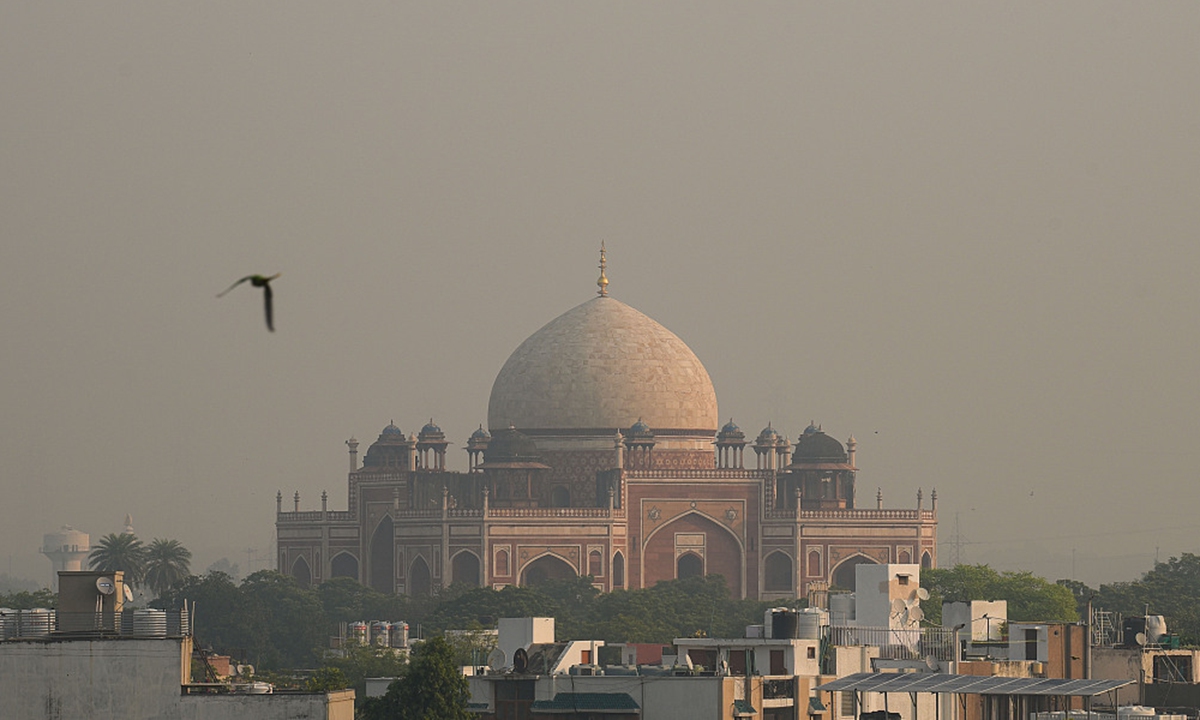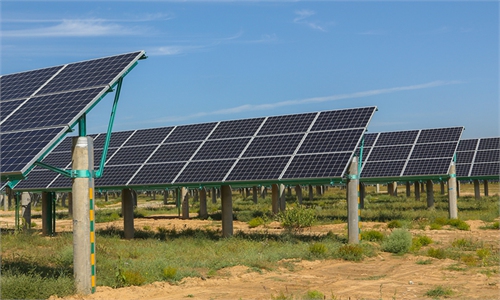India's rejection of net zero carbon emissions target shows key challenges facing COP26

A view of Humayun's Tomb at Nizamuddin on October 20, 2021 in New Delhi, India. Photo: VCG
India reportedly refused to announce a net-zero carbon emissions target ahead of next week's climate conference, COP26, in Glasgow, Scotland when countries around the world are expected to push actions to deal with the rise in the global temperature. Experts noted that India's reluctance to set a target shows its difficulties in balancing economic development and decreasing emissions and challenges lie ahead the upcoming climate summit.
India's top environmental official on Wednesday dismissed calls to set forth a net zero carbon emissions target, arguing such goals were not the solution to the climate crisis, Reuters reported.
India, the third-largest emitter of greenhouse gases after China and the US, is among very few G20 countries that has not set a net-zero target, which is considered an indicator of a country's willingness to step up emission cuts in the future with roadmaps about how those targets would be achieved, according to Indian media.
One reason for India's reluctance to set up the targets is that coal is still dominant in India's energy sector, and is 75 percent of India's greenhouse gas emissions, media reported.
As one of the most rapidly growing economies, India's promise to reduce emissions will inevitably affect its economic development, Tian Guangqiang, an assistant research fellow at the National Institute of International Strategy of the Chinese Academy of Social Sciences, told the Global Times on Thursday. "Its industrial level is backward, and emissions reduction pressure is relatively strong, making it difficult to achieve technological upgrades and transformation in a short time," he said.
The Indian government is committed to developing manufacturing in India, and does not want to impact its industrial development speed due to emissions reduction problems, the expert added.
"At this stage, India focuses more on economic interests than international responsibility for reducing emissions," he said.
As the two largest developing countries in the world, China and India have taken different attitudes toward emissions cuts. China has set a clear roadmap and phased targets, aiming to have CO2 emissions peak before 2030 and achieve carbon neutrality before 2060, while India has set no clear and long-term plans, Yang Fuqiang, a senior advisor on climate and energy with the Beijing-based consultancy Natural Resources Defense Council, told the Global Times.
Yang noted that India, as a developing country with the second largest population, faces many domestic problems on development including the wealth gap. It may need more years for it to have further development and take international responsibilities.
Aside from gaps in the industrialization level with China, the Indian government also worries a target on carbon emissions that is too radical may spark criticism from other political parties. And different governments may take different policies in the field, Yang said.
New Delhi said coal will continue to play a critical and essential role. It said in its biennial self-assessment report submitted to the UN , "Unlike countries proactive in planning for the phase-out of coal, only to replace them with oil and gas, India is transparent in its need for coal for its energy security, lacking any major domestic oil and gas resources. India will, however, use coal responsibly as testified by the number of clean coal initiatives being undertaken."
In the report to the UN earlier this year, India made clear that its responsibility toward mitigation of greenhouse gas emissions is low, "by any equitable measure of responsibility." It said that between 1850 and 2017, India has only contributed about 4 percent to global emissions. In recent decades, Delhi's assertion is that India has consumed far less than its fair share of the global carbon budget, while rich countries have consumed much more.
Analysts noted that the global work and ambition to stem emissions may be affected without active engagement of all countries, including India, and they also called on developed countries to take more responsibility.
Every conference and discussion on climate change has been marked by clashes between developing and developed countries, and countries of different ideologies, Yang said, noting that geopolitics is also an important factor in the field.
Compared to China, which has made actions and plans on cutting carbon emissions, India has faced less pressure and criticism from the West, analysts said.
The US and some Western countries appear to be stepping up pressure on China to make more commitments ahead of the Glasgow summit. But Chinese experts noted that China is gearing up to phase out coal consumption and achieve its goal of carbon neutrality, and will not bow to external pressure to act rashly.



